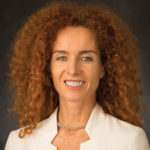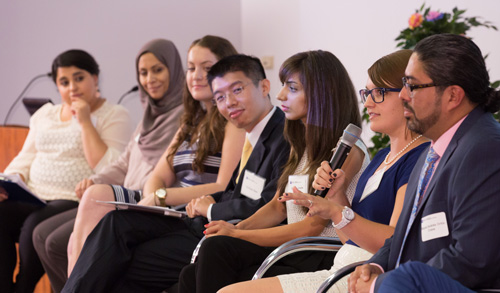Leaders in Higher Education
THIS GUIDE IS NO LONGER ACTIVE. For the current FP Guide, click here.
CAROLYN KISSANE, ACADEMIC DIRECTOR
NEW YORK UNIVERSITY SCHOOL OF PROFESSIONAL STUDIES, CENTER FOR GLOBAL AFFAIRS
As academic director of the MS in Global Affairs program at the New York University School of Professional Studies (NYUSPS) Center for Global Affairs (CGA), Carolyn Kissane encourages faculty members to continually think about their areas of expertise. “We are constantly monitoring global developments and thinking about how to give students the analytical and critical thinking skills they need to engage and become significant players,” says Kissane, who also serves as clinical associate professor and is coordinator of the program’s Energy and Environment concentration.
“We have to be quick, nimble, and flexible in the way we design the program,” says Kissane. “We integrate different disciplines and constantly work to make sure the curriculum is really in line with what’s happening in the world.” Last spring, the MS program introduced a new course on strategic risk, and this fall, a course on the concept of disinformation.
The MS in Global Affairs program has a strong applied orientation, with an emphasis on critical thinking, writing, and analytic skills. “We are working hard to weave in opportunities to engage in data analysis throughout the curriculum,” says Kissane. “Students need to understand how to read, interpret, and use data.”

“We have to be quick, nimble, and flexible in the way we design the program.” –Carolyn Kissane, Clinical Associate Professor and Academic Director, MS in Global Affairs program, New York University School of Professional Studies (NYUSPS) Center for Global Affairs (CGA).
MS students choose from among eight forward-thinking, interdisciplinary concentrations: Environment/Energy Policy; Global Gender Studies; Human Rights and International Law; International Development and Humanitarian Assistance; International Relations/Global Futures; Peacebuilding; Private Sector; and Transnational Security. Students can also take electives from any of the concentrations.
In the International Relations/Global Futures concentration, many students are attracted to courses focusing on geopolitical risk and country risk—areas of high demand among public and private sector employers.
The popular Transnational Security concentration includes courses on transnational crime, transnational terrorism, intelligence and counterintelligence, and much more. “We are building more curriculum in the field of cybercrime to help understand the strategies of perpetrators and how to counter them,” notes Kissane.
Students benefit from multiple opportunities to apply what they are learning. For example, an innovative new course called “Hacking for Energy” brings companies to campus to share problems they face. Each company is assigned a team of four or five students, who work to find solutions and present their results.

NYUSPS alumni panel
In the MS program’s Workshop in Applied Peacebuilding, students can gain meaningful field experience via the program’s partnerships with dozens of professional peacebuilding organizations.
During the course of their studies, most MS students participate in NYUSPS Global Field Intensives, in which they travel to a location abroad where their faculty leader has extensive experience and networks. In June 2017, for example, Kissane took a group to China for meetings with energy and environmental organizations.
After graduation, students continue to pursue areas they studied and use skills they learned in the MS program. “As faculty, we engage in a lot of dialogue and do a lot of strategic thinking to make sure the coursework remains relevant for students,” says Kissane.
Graduate Degree Program Option:
• MS in Global Affairs
Advanced Diploma Programs
In addition to the MS program, CGA offers advanced diploma programs for professionals who want to gain expertise by pursing a diploma in Clean Energy, Energy Finance, Infrastructure Security and Resilience, or Monitoring and Evaluation. Each program includes about four or five classes and can be completed in one or two semesters.
Visit the Request Info page to receive information from the schools.
Contents
- Leaders in Higher Education
- Johns Hopkins School of Advanced International Studies (SAIS)
- Georgetown University, Walsh School of Foreign Service
- Stanford University, Freeman Spogli Institute for International Studies
- Texas A&M University, Bush School of Government and Public Service
- New York University School of Professional Studies, Center for Global Affairs
- UC San Diego, School of Global Policy and Strategy
- University of Denver, Josef Korbel School of International Studies
- University of Washington, Henry M. Jackson School of International Studies
- Arizona State University, Center on the Future of War
- Georgetown University School of Continuing Studies
- Syracuse University, Maxwell School of Citizenship and Public Affairs; and Center for Strategic and International Studies
- University of Kent, Brussels School of International Studies
- Sciences Po, Paris School of International Affairs
- Columbia University, School of International and Public Affairs (SIPA)
- The Fletcher School of Law and Diplomacy at Tufts University
- University of Notre Dame, Keough School of Global Affairs
- Arizona State University, Thunderbird School of Global Management

